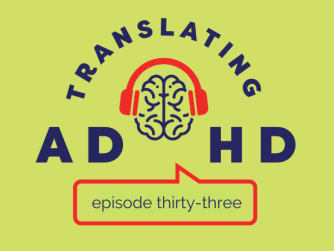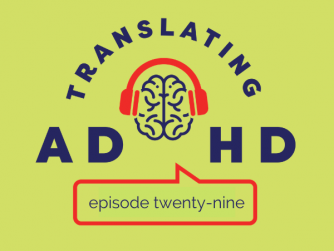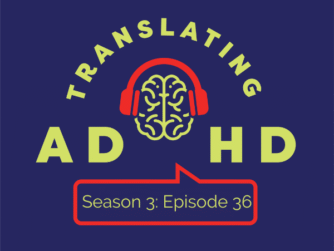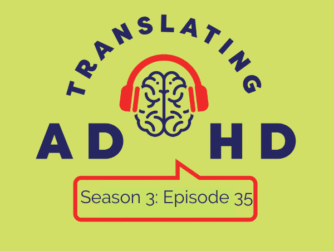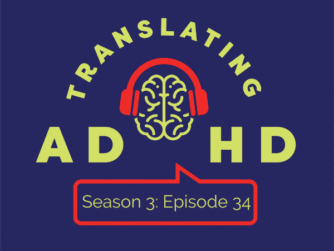Today Shelly shares very personal news. Shelly, living as a woman for 38 years, has come out as a transgender man. Meet Asher, listeners. Asher shares with Cam his journey to a more authentic life that fits. He discusses when one’s context changes almost overnight, sharing the dysphoria he felt living as a woman and reaching a pivotal galaxy-brain moment when disparate thoughts and feelings gelled into a new truth. Coincidentally, this is Transgender Awareness Week. Asher reveals the challenges but also the moments of clarity, support from friends and resolve as he moves through the process of stepping into becoming a man.
The hosts assure listeners that nothing changes about the Translating ADHD Podcast. We will continue to deliver the same nuanced coaching perspectives and insights on the ADHD lived experience as we always have.
Episode links + resources:
For more of the Translating ADHD podcast:
- Episode Transcripts: visit TranslatingADHD.com and click on the episode
- Follow us on Twitter: @TranslatingADHD
- Visit the Website: TranslatingADHD.com
Episode Transcript:
[00:00:00] Asher: Hi, I’m Shelly, [00:00:01] Cam: And I’m Cam. [00:00:02] Asher: and this is Translating ADHD. Quick Group Coaching reminder: Agency begins January 17th at 8:30 PM Eastern. Pricing and information on the course and the application are all on the website. Visit translatingadhd.com and click on the group coaching tab. [00:00:22] Cam: So we’re going off script today a bit. And Shelly has some news that she is gonna share with you. [00:00:31] Asher: So, Cam, first of all, saw you using that ‘she’ pronoun and making a face like it hurt you. So let’s explain that. It is Transgender Awareness Week this week, November 13th through 19th. And what better time to do this? I’m coming outta the closet. I am a transgender man. My name is Asher, and my pronouns are he and him. [00:01:02] Cam: Welcome. [00:01:03] Asher: Well, thanks. [00:01:05] Cam: I’m so glad to have you here and our bigger topic of your context matters. Asher and I were talking about this before the episode and how Asher’s context pretty much changed overnight. So we’re gonna take this episode to explore when your context changes and you become closer to your authentic self. Cuz Asher’s been telling me a lot about his experience of living for 37 years in a woman’s body and that this is, this really had to happen. So, we’re just gonna let the audience listen for a second and let that sink in that Asher is Asher and no longer Shelly. [00:01:54] Asher: I was never really Shelly, which is wild to think about. And I think the first thing I wanna say is that this isn’t something that I’ve been burying. It’s not something that I knew in a conscious way until a couple of months ago. [00:02:15] Cam: So we’re gonna talk a little bit later about in the context of the podcast, but right now, Asher and I were thinking about just sharing this experience of going back a couple months ago and what shifted. What changed? I was listening way back to episodes 35 through 37, where you were having this recognition of big C coaching and stepping into more of your authentic self, and you talked about Galaxy Brain. How this Galaxy Brain moment can have all these disparate thoughts and feelings all of a sudden come together and gel. It all makes sense now and you relayed that to me when you first shared with me that you are Asher and it became crystal clear. Can we go back to that of the before and after and what has become clear, Asher? [00:03:13] Asher: It’s a good question, Cam. You know, you recall back to those episodes three years ago, another seismic shift in my life because that’s also when I decided to ask my ex-husband for a divorce.I keep telling the universe I’m ready for a break. The last three years have been a lot, but we’re not there yet. And that’s okay, too. And it’s a, it’s a funny thing to talk about realization because of how much is so clear on the other side. But I can tell you how it started or not even how it started -How a seed was planted that brought it into my consciousness.
First of all, I’ve been questioning sexuality and gender since my divorce because something in that thread felt worth pulling on. Spent a lot of time thinking about those things. Not coming up with much in the way of answers. Sexuality wise, it’s still men for me, so I guess I’m coming out twice because I’m a gay man.
And so what’s not fitting, and when it comes to gender, I’ve, I’ve just never felt any kind of way about being a woman. I got good at it. The way you get good at something that you have to do, you know my let it be easy. That’s how I did womanhood. I made it really efficient. I learned how to do makeup one way that went with everything. I learned how to pick clothes that were comfortable on my body. and that were comfortable for my sensory issues.
But even looking my best, I would look in the mirror and I could objectively see, Ooh, I look pretty today. But I didn’t feel any kind of way about it. And so one night I’m laying in bed and I’m browsing Reddit, and I come across this post. By a fellow transgender man who realized he was translator in life, and he said, I probably could have lived the rest of my life as a woman and been okay because my dysphoria isn’t so crippling.
For those of you who don’t know what the word dysphoria means, we’re talking about gender dysphoria. That is what makes a transgender person trans. It’s the characteristics of your body not matching the gender that you are and the discomfort or pain that that creates. Here’s where we’re talking about your context matters. That’s different for every single trans person. And the decisions that they make about their transition, their context matters.
So anyway, I’m reading this post and the next thing he said was, I didn’t really understand what dysphoria was until I felt euphoria. Cam, you asked me when I first came out to you and told you that to explain euphoria, and my response was I don’t, I don’t know if I know how to explain that to cisgender person, a person whose assigned gender at birth matches who they are. But the best I could come up with is when you know you look handsome, somebody tells you you’re handsome, whatever, that that feeling is inside. I never felt that once in my life as a woman. Not once. For me, it was more okay, those are context clues that I’m doing the woman thing correctly.
[00:06:47] Cam: I’m playing my part in this game. [00:06:49] Asher: Yeah, I’m playing my part in this game. And so that post kind of stuck in my subconscious. And later that weekend I decided to say something to my partner because I just couldn’t shake it, and I was suddenly feeling so much more uncomfortable in my woman’s body. In fact, the night that I told him we were out for a date night, we were all dressed up. I just felt like I wanted to crawl outta my skin, and that’s when I put two and two together. I’m out with this man that I love. We’re at a drag show, which is always a good time. So what is it that’s making me so uncomfortable in this situation? So we left and I told him, and I said, I’d like you to try calling me ‘he.’ I’d like to experiment with this a little bit.Then I understood what euphoria means which, by the way, was utterly terrifying. The first two or three weeks after that moment were spent trying to figure out, is this true? Is this real? So how do you figure that out? Well, number one, I chose a man’s name for myself and I came out to my inner circle, which included Cam, listeners, and I told them I was still questioning, but that I would like them to start referring to me in these ways to see how that felt. I went out and bought some men’s clothes, and that was really an important moment because once I put the boy clothes on, I couldn’t put the girl clothes on again, and that actually became kind of a metaphor for checking in with myself.
You know, it’s so easy to spiral out. Is this real? Do I wanna take steps? Do I wanna move forward with this? This affects my whole business sidebar there because it’s really funny. When Jen and I split up our business partnership in 2020, because we were no longer doing the same work, that’s in 2019, I really pivoted to coaching full-time. And we decided it no longer made sense for our business entities to live under the same umbrella. It was time for us each to go our own way because our past diverged. I’m also going through a divorce at this time and having to rebrand my business, and I said, okay, this is my fourth rebrand in 10 years of being in business for myself, first as an organizer, now as a coach. This time I’m gonna be smart and I’m just gonna put it under my name so that I never have to change it again.
[00:09:36] Cam: How’s that working for you? [00:09:40] Asher: Well, I have learned to never get too confident in the fact that I’m done or that I’m settled. Let’s just say that. [00:09:49] Cam: Well, this is, uh, you know, as I’m sitting here and I’m thinking about lots of different ways to just discuss this and, and share and just bringing in elements of the podcast, I’m noticing is journey thinking. Really embracing the keen observer and questioning and bringing curiosity and presence. We’ve talked about that and embracing the journey that you are not done. We’re not done. That’s what I’m hearing. [00:10:19] Asher: And that’s really what the last few months of my life have been is taking a small step forward, pausing there. Anytime I start to question, going back to that question of do you wanna put the girl clothes back on? Do you wanna take a step back? And every time, just a visceral gut reaction when I ask myself that question of, do you wanna put the girl clothes back on? It is a visceral, full body no.So then I have to ask myself, Okay, well do you wanna stay here in this weird in between place? Where those closest to you know, but professionally you’re showing up as somebody else. And the answer to that is also no, Cam. You and I are so good at what we do because we are so authentic. We don’t know how to be any other way, but to show up authentically as ourselves. And that’s something you modeled for me when you were my coach.
And so here we are. it’s just time. And every step I take forward feels better than the last. Here’s a funny thing: it’s like I’m so clearheaded. Even in those early days when I was among friends, I have a lot of queer friends who showed up and were very supportive early on, spent a lot of time with them. And I remember the first time I felt normal in a really long time was sitting out on my deck with a friend of mine who’s a transgender guy. I asked him to come over so that I could talk this out with him and hopefully glean something new.
And I did glean a lot of very relevant information by talking to him. But more importantly, we didn’t talk about that the whole time. We kind of slid into just talking and hanging out. And then the next night, Jen and her husband – so Jen being my assistant, our podcast assistant, my former business partner, and also my best friend – came over and I came out to them, and it was the same thing where I came out and we talked about it for a little while, and then we just moved on and had our evening.
And after those back to back social events where I was showing up as myself, I realized I’ve had so many background processes running in social situations for my entire life about how I’m supposed to show up and who I’m supposed to be as a woman in these situations, and that’s all just gone now.
And I wanna be clear that I do have dysphoria. It was feeling euphoria and feeling correct and comfortable in my own body for the first time that highlighted for me, I’ve been carrying around this low level depression my whole life, or at least what I thought was low level depression. What I thought was low energy, and that’s gone, too. And that is wild.
[00:13:40] Cam: We talk a lot on the podcast about masking, you know, as a, as a neurodiverse individual masking in a neuro, in a neurotypical world. And before you knew you had ADHD, it was about masking and showing up and trying to do it in a conventional, linear, systematic manner. So you’re talking here masking as a woman [00:14:06] Asher: Yeah, Cam, and I’m really glad you brought that up because I had thought about that parallel between that ADHD experience of not knowing what you don’t know until you do. And as somebody who has lived both experiences, I would say they have more in common than they don’t.So, listeners, that ADHD journey that you’re on from discovery and whatever discovery was like for you, whether it was a relief or it was something you had to grieve. For most people, I think it’s a pretty strong mixture of the two. Like now I know, but now what that very, very similar experience to this.
[00:14:56] Cam: Was the word terrifying you said? What was the word you used, again, after the Reddit post and you’re questioning and wondering, It wasn’t all euphoria, it wasn’t all amazing. It was something else, right? Again, your own process of discovery where this data is coming very quickly and you are grappling with it, you’re wrestling with it, you are considering in wane, and it is I think like that anytime we have some new data present itself, there is a process there. We all have our own experience in how we experience change, but the fact remains was that you were open to that change. [00:15:44] Asher: Cam, the word was terrifying. It’s interesting that you say that. What has served me so well is being open to the journey because I agree with you. Early on, I had a really tough time with the fact that I missed my prime as a man. I’m 38. Puberty takes two to five years. I’m gonna be in my forties before my outer appearance matches who I am.And I also spent a lot of time wondering how I didn’t know. How could I not know? And gosh, that could be so many podcast episodes, but that’s not what this podcast is about.
A short version is I grew up in a repressive religious environment at a time when most people did not know that transgender people exist. And what they did know was very little. The nineties when I grew up, transgender people were the butt of jokes. Chandler’s mom on Friends – that’s the type of representation you saw for transgender people. And then when I got married, I even thought about how my marriage worked for so long, and that’s because our relationship wasn’t gendered in most ways, because my ex-husband is uniquely the amazing guy that he is. But then I got married, and I started working on other pieces of the puzzle of a life that fits. I was starting a business and then I was figuring out ADHD, and then I was pivoting into this higher purpose of this ADHD coaching and advocacy work.
So I now know why I didn’t know. And in some ways I do have an advantage because I don’t just preach journey thinking, I live it, and that that’s kind of a cheat code. It short-cutted the process of fear and terror and hiding from it because I’ve grappled with big questions like this before in this way.
And I knew that I could stay on the journey. I could always put the girl clothes back on. Jen, so lovely, she took seven trash bags. She took my whole wardrobe to her house. She said, I’ll organize it, I’ll keep it all, and you have a key to my house. So if at any time you need to put the girl clothes back on, or you need to take a step back, they’re still there for you.
So yeah, it’s been a journey all the way. But you know, there’s the terrifying part on the backside of how could this be? How could I not know? Is this right? Am I gonna make a mistake? Am I going to take steps that I’m gonna regret later? But then as I got more and more sure, there’s terror facing forward. It is a hell of a time in history to be a transgender person. The sheer amount of misinformation and propaganda put out for political gain were more visible than ever, and it’s not good visibility, you know. For those of you that remember the gay agenda in the nineties, that’s what transgender people are going through right now, in this moment in history. And on top of that, all of my context changed overnight. What was simple and easy and routine isn’t right now.
When I got my first masculine haircut, my partner asked me if he should go with me, and I said, no, my hair’s already short. This isn’t a drastic change. It’s not a big deal. It’s just a haircut. When I got there, I can tell you it was not just a haircut. It was a very emotional experience on a number of levels on the front side, just trying to articulate to this lovely, lovely, queer friendly barber.
Ugh, I was not okay, but it was okay for me to not be okay with her. But just trying to articulate what’s going on, walking in, looking like a woman, and having to tell this person I’ve just met, I’m a man, and this is gonna be my first men’s haircut at age 38. And then when she turned me around -and you all get to see my new profile picture – she gave me an amazing haircut. Somebody told me I have Tan France hair. What a compliment. And I really kind of do. I have all this natural volume that she just worked with,
[00:20:44] Cam: I’m so envious. [00:20:47] Asher: But when she turned me around, Cam, I saw a really good men’s haircut on an aging woman’s body, and that was when that grief of missing my prime really hit hard. So even just a haircut isn’t a haircut, but more than that, I have no wardrobe. I have to rebuild my entire wardrobe from the ground. I’m looking at a year, two, three -puberty’s unpredictable, as you know, right?All of you listening have been through it once, and you remember how some kids bloom too early and some bloom too late, and most fall somewhere in the middle. It works exactly the same way the second time around. So now we’re looking at a year or two or three where I am visibly trans or visibly queer in some way. And that means I have to think carefully about what spaces I feel safe in. Places that I would have never thought twice about going before, I think pretty carefully about, you know.
Pretty early into this realization, my partner and I had concert tickets and it was a local show here in St. Louis, but a band we really loved, the same band that we saw a ton of shows over the summer with, and I didn’t know what to wear. I didn’t know if I should wear a pronoun pin or not. I didn’t know if I was ready to tell the concert buddies that I was running into. And most importantly, if I do wear a pronoun pin and say, Hey, I’m a man, I’m he, him, I have to use the men’s bathroom, which I’ve never done in my life. So this thing of going to shows, which has been a huge part of my personality since I was 18 years old, all of a sudden there’s all of this extra stuff to think about. I have to figure out how to use the bathroom safely in an environment that I would’ve never felt unsafe in before, even as a woman.
[00:22:56] Cam: Asher, I just, I appreciate being here with you and being able to witness this with you, and as a gendered male who had puberty years and years and years ago, [00:23:09] Asher: Just a few. [00:23:11] Cam: Just a few. It just has me thinking about gender and sexuality and considering terms and topics and feelings and experiences that I don’t think of. So I just appreciate you fully stepping into your authentic self because this is courage. This is courageous. We don’t know how this is gonna land with our listeners. So Asher is putting this out there to the world people, and I think as we pivot to moving forward, to address to our listeners, okay, what does change and what doesn’t? What can they expect going forward in their experience of listening to the Translating ADHD podcast with Asher and Cam? [00:24:04] Asher: Let’s start with what doesn’t change. I’m the same person. It’s not like, Oh, I’m a man, so now my whole personality has to change. I’m still me, and this is still a podcast about ADHD and lived experience. This is not a podcast about my trans journey. So very little is gonna change between us other than my name, and the funny one is my voice. [00:24:38] Cam: It’s gonna get much more baritone. [00:24:44] Asher: So when I start testosterone, my voice will start to change and may crack sometimes early on. Sorry about that, listeners, can’t do much about it. Funnily enough, I was telling my partner, we should document that. We should document the voice changes. And then I realized I have a weekly podcast. I don’t need to document the voice changes – that’s going to be done for me. So my name, my voice and my lived experience when it’s relevant to the topic at hand. But this lived experience is my journey, and this podcast has never been about my journey or Cam’s journey.It’s been about helping you, listener, get on your own journey by way of sharing. So, yeah, we might talk about transgender stuff on occasion when it’s relevant to the topic, just like we’ve talked about a lot of other things in our personal lives when it’s relevant to the topic. But otherwise, not much is gonna change about the show.
And here’s where I wanna bring back a model, Cam. We talked about this a while back, talking about ADHD people and interpersonal relationships and how we tend to take up all the blame in a situation when something has gone awry. It’s just our natural response, and the model we introduced is yours, mine, and ours. The idea being breaking down What’s your stuff? What’s their stuff? And what’s the stuff that lives in the middle that needs to be co-created between two people? And the big idea behind that model is you only have control over your stuff. The ‘our stuff’ and ‘their stuff’ requires engagement from the other person.
And so here’s where I’m gonna set a pretty hard boundary. So, listeners, I hope you all stick along for the ride, and I imagine most of you will. Our community is amazing. However, If my identity creates a problem for you and your relationship to this show, that falls under your stuff, and I have no control over your stuff other than to make an ask. Keep listening anyway. Don’t give up the good resource of this show. Maybe I can model for you that trans people are just people. I just wanna keep doing my good work and living my life, and this is just another piece of the puzzle of a life that fits for me. A big one. An important one, but it’s just another piece.
[00:27:28] Cam: Eloquently said, Asher. I look forward to 152 more episodes with Asher and Cam. [00:27:38] Asher: And my ever-changing puberty. Ha ha ha. [00:27:43] Cam: Tune in just for that. [00:27:46] Asher: Listeners, we were actually sort of debating, is it gonna be Asher and Cam or is it gonna be Ash and Cam? Do I do the Cam thing where I shorten my name or not? I don’t know. So, Cam, let’s do it both ways. So I’m Ash. [00:28:01] Cam: And I’m Cam. [00:28:02] Asher: and this was the Translating ADHD podcast. Thanks for listening. Now let’s do it again. So, I’m Asher. [00:28:09] Cam: and I’m Cam. [00:28:10] Asher: and this was the Translating ADHD podcast. Thanks for listening. Let us know which one you like. We couldn’t decide. See you next week.


